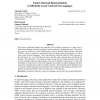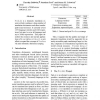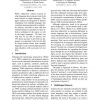2944 search results - page 8 / 589 » On Well Quasi-orders on Languages |
JMLR
2010
13 years 2 months ago
2010
We present a polynomial update time algorithm for the inductive inference of a large class of context-free languages using the paradigm of positive data and a membership oracle. W...
EMNLP
2009
13 years 5 months ago
2009
We present a scalable joint language model designed to utilize fine-grain syntactic tags. We discuss challenges such a design faces and describe our solutions that scale well to l...
CORR
2011
Springer
13 years 2 months ago
2011
Springer
Existing grammar frameworks do not work out particularly well for controlled natural languages (CNL), especially if they are to be used in predictive editors. I introduce in this p...
COLING
2010
13 years 2 months ago
2010
PanLex is a lemmatic translation resource which combines a large number of translation dictionaries and other translingual lexical resources. It currently covers 1353 language var...
21
Voted
COLING
2010
13 years 2 months ago
2010
While subjectivity related research in other languages has increased, most of the work focuses on single languages. This paper explores the integration of features originating fro...



